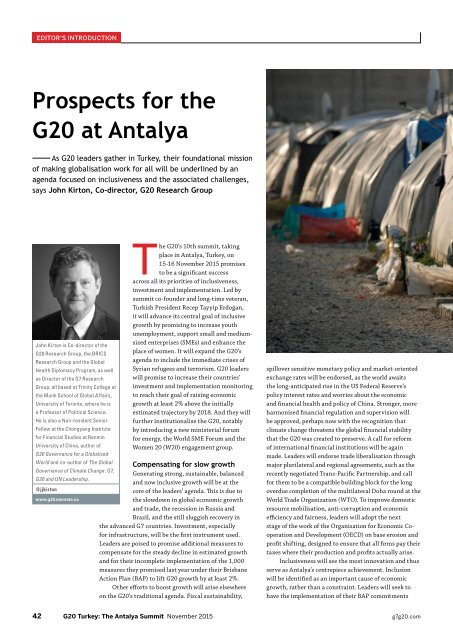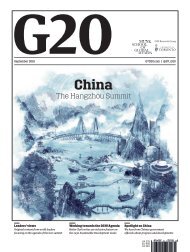G20-2015 Turkey
You also want an ePaper? Increase the reach of your titles
YUMPU automatically turns print PDFs into web optimized ePapers that Google loves.
EDITOR’S INTRODUCTION<br />
Prospects for the<br />
<strong>G20</strong> at Antalya<br />
As <strong>G20</strong> leaders gather in <strong>Turkey</strong>, their foundational mission<br />
of making globalisation work for all will be underlined by an<br />
agenda focused on inclusiveness and the associated challenges,<br />
says John Kirton, Co-director, <strong>G20</strong> Research Group<br />
John Kirton is Co-director of the<br />
<strong>G20</strong> Research Group, the BRICS<br />
Research Group and the Global<br />
Health Diplomacy Program, as well<br />
as Director of the G7 Research<br />
Group, all based at Trinity College at<br />
the Munk School of Global Affairs,<br />
University of Toronto, where he is<br />
a Professor of Political Science.<br />
He is also a Non-resident Senior<br />
Fellow at the Chongyang Institute<br />
for Financial Studies at Renmin<br />
University of China, author of<br />
<strong>G20</strong> Governance for a Globalized<br />
World and co-author of The Global<br />
Governance of Climate Change: G7,<br />
<strong>G20</strong> and UN Leadership.<br />
@jjkirton<br />
www.g20.utoronto.ca<br />
The <strong>G20</strong>’s 10th summit, taking<br />
place in Antalya, <strong>Turkey</strong>, on<br />
15-16 November <strong>2015</strong> promises<br />
to be a significant success<br />
across all its priorities of inclusiveness,<br />
investment and implementation. Led by<br />
summit co-founder and long-time veteran,<br />
Turkish President Recep Tayyip Erdoğan,<br />
it will advance its central goal of inclusive<br />
growth by promising to increase youth<br />
unemployment, support small and mediumsized<br />
enterprises (SMEs) and enhance the<br />
place of women. It will expand the <strong>G20</strong>’s<br />
agenda to include the immediate crises of<br />
Syrian refugees and terrorism. <strong>G20</strong> leaders<br />
will promise to increase their countries’<br />
investment and implementation monitoring<br />
to reach their goal of raising economic<br />
growth at least 2% above the initially<br />
estimated trajectory by 2018. And they will<br />
further institutionalise the <strong>G20</strong>, notably<br />
by introducing a new ministerial forum<br />
for energy, the World SME Forum and the<br />
Women 20 (W20) engagement group.<br />
Compensating for slow growth<br />
Generating strong, sustainable, balanced<br />
and now inclusive growth will be at the<br />
core of the leaders’ agenda. This is due to<br />
the slowdown in global economic growth<br />
and trade, the recession in Russia and<br />
Brazil, and the still sluggish recovery in<br />
the advanced G7 countries. Investment, especially<br />
for infrastructure, will be the first instrument used.<br />
Leaders are poised to promise additional measures to<br />
compensate for the steady decline in estimated growth<br />
and for their incomplete implementation of the 1,000<br />
measures they promised last year under their Brisbane<br />
Action Plan (BAP) to lift <strong>G20</strong> growth by at least 2%.<br />
Other efforts to boost growth will arise elsewhere<br />
on the <strong>G20</strong>’s traditional agenda. Fiscal sustainability,<br />
spillover sensitive monetary policy and market-oriented<br />
exchange rates will be endorsed, as the world awaits<br />
the long-anticipated rise in the US Federal Reserve’s<br />
policy interest rates and worries about the economic<br />
and financial health and policy of China. Stronger, more<br />
harmonised financial regulation and supervision will<br />
be approved, perhaps now with the recognition that<br />
climate change threatens the global financial stability<br />
that the <strong>G20</strong> was created to preserve. A call for reform<br />
of international financial institutions will be again<br />
made. Leaders will endorse trade liberalisation through<br />
major plurilateral and regional agreements, such as the<br />
recently negotiated Trans-Pacific Partnership, and call<br />
for them to be a compatible building block for the long<br />
overdue completion of the multilateral Doha round at the<br />
World Trade Organization (WTO). To improve domestic<br />
resource mobilisation, anti-corruption and economic<br />
efficiency and fairness, leaders will adopt the next<br />
stage of the work of the Organisation for Economic Cooperation<br />
and Development (OECD) on base erosion and<br />
profit shifting, designed to ensure that all firms pay their<br />
taxes where their production and profits actually arise.<br />
Inclusiveness will see the most innovation and thus<br />
serve as Antalya’s centrepiece achievement. Inclusion<br />
will be identified as an important cause of economic<br />
growth, rather than a constraint. Leaders will seek to<br />
have the implementation of their BAP commitments<br />
42 <strong>G20</strong> <strong>Turkey</strong>: The Antalya Summit November <strong>2015</strong> g7g20.com
















